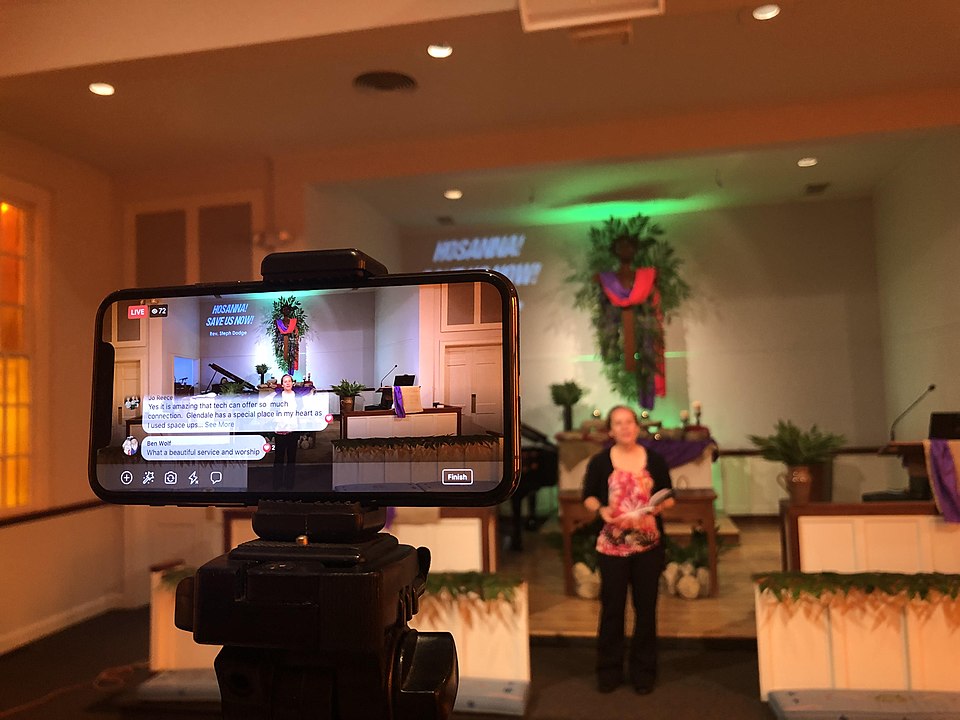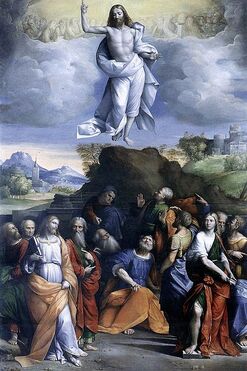In today’s reading from Acts, the disciples are dealing with change, once again. A couple of months ago, Jesus was alive and well and preaching to crowds in Galilee. A little more a month ago, the women found that Jesus’ crucified body was no longer in the tomb. Immediately after that, the risen Jesus began appearing to the disciples, continuing to instruct them about his mission and their ministry. Now, 40 days after his resurrection, Jesus leaves the disciples, ascending into the clouds. Just when the disciples had become accustomed to having his risen presence around, Jesus disappears. They have been through enormous changes in the last 6 weeks – the jubilation of Jesus’ entry into Jerusalem, the terror of his arrest, the despair of his death, the joy of his resurrection, and now, another loss. Before his ascension Jesus tells them that they will receive the power of the Holy Spirit, but he doesn’t specify when that will occur. So the followers of Jesus do the things they know to do: They return to home base – the upper room where they were staying -- they stick together, and they pray. Since its inception Christianity has lived in the tension between change and stability. And Christianity is propelled forward by communities of people who hold together and pray. I suspect that many of us are like my grandmother. We have no problem with adapting to iPhones, social media, and streaming videos. But we want the things that speak most deeply to us – the traditional language of the Lord’s Prayer, the words of our favorite Christmas carols – to remain always and forever the same. Even people who like the contemporary language in the Book of Common Prayer select for their funeral the King James Version of Psalm 23 – “The Lord is my shepherd, I shall not want.” We may be tempted to scoff at people like my grandmother for holding on to an old-fashioned translation of the Bible. But the language of the King James Bible fed her soul and served as a pathway for her to God. That formal, Elizabethan language reconnected Mum-Mum with her past and enabled her to once more experience the divine. The language and rituals of our faith resonate deeply within us. In another parish I witnessed intense and bitter arguing over whether to use wax candles or oil candles on the altar. What most people failed to realize was, the fight wasn’t about candles at all. What was at stake was people’s inexpressible but deeply held feelings about how God is to be worshiped and honored. In churches, decisions to change things that seem trivial can cause deep rifts. So, as the church in a time of pandemic, the question we need to be asking ourselves is: What can change and what must stay the same? What do we need to hold on to? What can we let go of? First and foremost, we hold on to Jesus. Presumably, the disciples knew Jesus better than anyone else. They spent years with him. But even they misunderstood him much of the time. Today’s reading from Acts is a classic example. The last question the disciples ask Jesus is, “Is this the time when you will restore the kingdom to Israel?” Scripture doesn’t say this, but I have an image of the risen Jesus tearing at his post-resurrection hair. How can the disciples have been following him all this time and still think his mission is about overthrowing the Roman occupiers and restoring the government to the Hebrews? So we need to realize that we’ll make mistakes, too: following Jesus is not an easy or self-explanatory thing to do. As long as we keep Jesus as the center of our worship, our meetings, and our ministries, we’re placing the emphasis where it belongs. Although the path forward may not always be clear, Jesus is the one who leads us.  Online worship services many become more "normal" after the COVID-19 pandemic. Credit: Glendale United Methodist Church, Nashville, TN Source. Second, we hold on to one another. As Jesus was crucified and died on the cross, the disciples scattered. As Jesus ascends into heaven, the disciples remain together, awaiting the coming of the Holy Spirit, which we know will happen on the Day of Pentecost. Today’s reading from Acts gives us a glimpse of the first church community, comprised of the male disciples, women followers (including Jesus’ mother Mary), and Jesus’ male siblings. This community remained cohesive after Jesus’ ascension. Third, we hold on to prayer. A friend of mine refers to prayer as her drug of choice, calling it the greatest anti-anxiety medication ever created. Calling upon God in times of stress may not eliminate the problem, but it can certainly reduce tension. And when we pray together, when we gather as a group – even virtually -- and make supplication to God on other’s behalf, powerful things happen. So that brings us to what we let go of. We let go of our own agendas. The disciples wanted Jesus to kick out the Romans. Jesus wanted the disciples to tell the world about the healing power of Christ’s love. Jesus wanted his message of good news to be proclaimed, so that all people could be reconciled to God and to one another. As Jesus says to God in today’s reading from the Gospel of John, “All mine are yours, and yours are mine; protect them in your name…so that they may be one, as we are one.” We let go of the illusion that we’re in control. God is in charge, we are not. As Jesus tells the disciples, so he tells us, “You will be my witnesses…to the ends of the earth.” We’re to show up and be Christ’s hands and feet in the world. The outcome of our labors is God’s business, not ours. God defines what it means to be successful, so we don’t have to. We’re merely asked to be faithful. The twin engines of change and stability have characterized the Christian faith since the day of Jesus’ ascension. So what does that mean for St. John’s Church in Tower Groves? It means that more change is coming, we will remain together in community, and prayer will bind us all. At some point this summer, St. John’s will probably resume in-person worship. When that will happen and what that will look like we don’t know yet. The Vestry needs to consider the ideas being proposed by the Worship Committee, and then a wider conversation needs to happen within our worshiping community. But one thing is fairly certain: When in-person worship resumes, it will not be the same as before mid-March. To maintain 6 feet of social distance will require us to strictly limit the number of people we can have in the sanctuary at one time. So, it’s likely that we’ll need two worship services each Sunday to accommodate the size of our congregation. What effect will this have on us? It means that not all of us will be together on Sunday mornings. Whether we choose to admit it or not, a change like starting an additional worship service will produce anxiety. People we counted on seeing on Sundays at 10:30 a.m. will be attending service at a different time. We fear that as a consequence we won’t be as deeply connected. Before we can resume in-person worship we have to address many difficult questions, such as: How can we keep our space virus-free and yet still inviting? How can we keep our worship musically rich without congregational singing? Is it even possible to resume the Eucharist and keep everyone safe? A lot more change is coming to St. John’s and with those changes come a whole host of feelings. So what do we do with these feelings? We admit them. We discuss them. We face them together. We hold fast and pray. And so, Jesus, help and guide us to change. Give us a sense of peace in the midst of uncertainty, knowing that you can be trusted to lead us along the path we are called to walk. Give us courage to voice our fears, so that we may take comfort in you and in one another. Bind us together in prayer. We ask this in your holy name. Amen. The Reverend Sally S. Weaver is co-priest in charge at St. John's
0 Comments
Leave a Reply. |
Editorial contactVarious members of the St. John's congregation contribute to this blog. For editorial suggestions, contact Jeff McIntire-Strasburg at [email protected] Archives
May 2024
CategoriesAll Bishop Deon Johnson Book Group Congregation Members Deacons Diocese Of Missouri Episcopal Church Features General Information Parish Events Podcast Presiding-bishop-michael-curry Sermons Terms-of-transition Vestry |

 RSS Feed
RSS Feed

